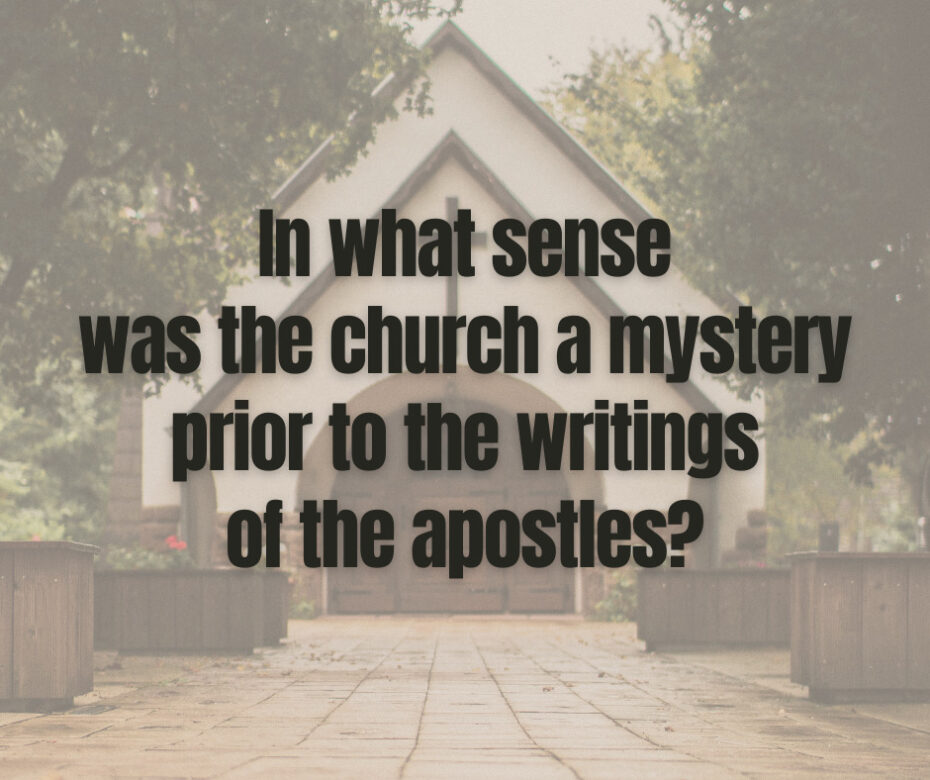Brad asks a great question about a recent blog on binding and loosing (see here and the follow up, here):
Good blog! One question, though. The church was nowhere in sight (it was still a secret) when Jesus spoke those words to Peter. The word translated church could be translated gathering or assembly. It was in an Israel or Jewish context. I agree that they were delegated power to forbid or allow practices, but to what gathering or assembly?
Brad is correct that the church was a mystery until the writings of the apostles (cf. Eph 3:1-12; 6:19; Col 1:26-27). However, the question is, what does the word mystery mean in the NT?
The word mystery is used to refer to ten things other than the church in the NT. Other things called mysteries are the mystery of godliness, of divine indwelling of Christ in us, the mystery of the kingdom of heaven, the mystery of the Rapture, the mystery of Israel’s blindness, the mystery of iniquity, the mystery of Babylon, the mystery of the church as Christ’s bride, and the mystery of His will. See this article by Clarence Larkin for Scripture references and details.
It should be obvious that all or nearly all of those things were discussed in the OT and in the Gospels too.
So, what does the word mystery mean in the NT?
It refers to something that could not be understood without additional revelation. It does not refer to something that had never been revealed.
R. T. France comments on ekklēsia in Matt 16:18 as follows:
But now Jesus speaks with extraordinary boldness of “my ekklēsia”—the unusual Greek word-order draws particular attention to the “my.” The phrase encapsulates that paradoxical combination of continuity and discontinuity which runs through the NT’s understanding of Jesus and his church in relation to Israel. The word is an OT word, one proudly owned by the people of Israel as defining their identity as God’s people. But the coming of Israel’s Messiah will cause that “assembly” to be reconstituted, and the focus of its identity will not be the nation of Israel, but the Messiah himself: it is his assembly. How much of this theology of fulfillment the disciples could have been expected to grasp there at Caesarea Philippi is debatable, but for Matthew and his readers, as members of the Messiah’s ekklēsia, the phrase would aptly sum up their corporate identity as the new, international people of God (Matthew, pp. 623-24).
Lenski adds, “On the rock named in Peter’s confession Jesus says, ‘I will build my church’…We may take it that he refers to the day of Pentecost, or, if we wish to speak more exactly, that this building process has already begun and would continue in the future” (Matthew, p. 627).
I remember hearing a great message by Zane Hodges about Psalm 45. He suggested that the Kings’ daughters and honorable women (Ps 45:9) referred to believing Israel and that the queen, the royal daughter (Ps 45:9, 13ff.) referred to the church. He did not explain his understanding of the church as a mystery. But later I asked him about it.
Zane said that Biblical mysteries are things hidden in plain sight. There are truths found in prior revelation that cannot be understood without further revelation.
Consider, for example, the Rapture of the church. The taking up of Enoch and Elijah into heaven in whirlwinds surely were types of the Rapture. Yet no one reading the OT would be able to figure that out without NT revelation.
It is true that the word translated church in Matt 16:18 and 18:17 is the word ekklēsia, and it could simply refer to the assembly. However, when Christ promises He will, in the future, build His church on the rock that was Peter’s confession and that the gates of Hades shall not prevail against it, we know from later revelation that He was actually speaking about the church, the body of Christ.


